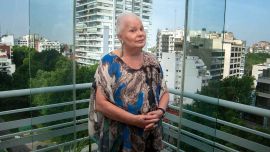In a very difficult economic context, the 2024 edition of the annual Feria Internacional del Libro de Buenos Aires promises to be – now more than ever – a space for dialogue, a meeting between peers and resistance in the face of a hostile political power in the form of President Javier Milei’s government.
The most popular cultural event in Argentina, which opens to the public on April 25 with activities running until May 13, is opening its doors at a critical time for the industry, which like the rest of us is gripped by Argentina’s endless economic crisis.
With general book prices now above 20,000 pesos and a fall in sales over the last two months calculated to be around 30 percent, both organisers and sellers are cautious when it comes to forecasting numbers, reserving their optimism for the largest Spanish-language book fair in the world.
To add insult to injury, the Culture Secretariat (downgraded from ministry status by Milei) announced earlier this year that it would not take part in the event with the traditional national government stand, which previously highlighted the activities of the Culture Ministry, Education Ministry and the National Library.
Citing budgetary reasons, Culture Secretary Leonardo Cifelli announced that the national administration could not afford the alleged 300 million pesos the stand cost.
The figure was fake the actual cost is approximately 70 million pesos), as clarified by authorities from the event’s organisers, the Fundación El Libro, but neither the negotiation nor U-turn was possible. They are the same budgetary reasons that forced some provincial governments to refrain from providing their normal presence or forced others to join together in the same space. The national administration’s stand was ultimately taken up by the Buenos Aires Province government.
The price of the tickets has also been discussed, given that weekday entrance has risen from 800 pesos in 2023 to 3,500 pesos in 2024, an increase some consider to be above the pace of inflation. Without splitting hairs, the truth is the cost will be felt by pockets, especially at the weekends when the value of a ticket rises to 5,000 pesos.
To offset the hike, Fundación El Libro will offer its traditional discount for purchases and will provide “cheque libros” (“book cheques or vouchers”), which will help visitors purchase books outside the Fair, at bookshops, at a lower price.
Problems
“There are a great deal of economic, social and political problems,” said Alejandro Vaccaro, the president of Fundación El Libro, in an interview with Noticias magazine.
“The country is devastated by the constant attacks from a government that is totally insensitive to culture,” he complained.
“But the Fair has proved it has sufficient strength to keep people’s interest in books and reading alive. It’s also a great setting for debate, at this crucial time, [about] the future of Argentina,” said Vaccaro.
Adriana Fernández, editorial director of Planeta, one of Argentina’s biggest publishers, is eagerly awaiting the “party for books” that lies ahead.
“Every year it’s inevitable to ask how we’ll do at the Book Fair, because, doubtless, Argentina every year has its particular features that configure the country,” she said.
“We await this gathering because it’s a milestone for the publishing industry, a call to experience and enjoy 21 days of non-stop activities. But, above all, because during these days we recognise each other,” said Fernández.
“We trust the Fair – which is a party for books – can be a moment for distraction, pleasure and joy in the face of a tense and difficult setting,” said a spokesperson for fellow-publisher Penguin Random House.
“As for the financial aspect, our strategy is to make it possible for readers to get books in different formats and prices. We’ll continue to work with the entire value chain in the industry to keep books within the reach of the greatest number of readers,” they added.
With fewer sales, but still plenty of willingness, those who are essential to the Fair know that, whatever the financial outcome, the next few weeks are fundamental for the industry. To them, the result is ultimately always positive.
Opening drama
Vaccaro said not all the voices present would be anti-Milei ones – not least because the President himself will be there.
Milei has also announced his visit to present his own latest work, Capitalismo, socialismo y la trampa neoclásica, on Sunday, May 12, at the La Rural exhibition centre’s main arena. Anything could happen.
“We aspire to have discussions of ideas and models of the country there. We’re interested in a plurality of voices,” said Vaccaro.
Local media reports say Milei has organised his appearance directly with La Rural’s authorities and not via the event’s organisers, Fundación El Libro.
Nevertheless, it looks like there will be some opening day drama. The always anticipated inaugural speech will be made by writer Liliana Heker, who said recently “there’s no chance I won’t allude to the current context.”
“I’m aware that we’re going through an absolutely uncertain and insane reality,” she said.
Heker will be accompanied by the authorities from Fundación El Libro, as well as Buenos Aires City Culture Minister Gabriela Ricardes and – much to everyone’s surprise – Cifelli, the national culture secretary who has, against all odds (impossible not to remember previous boycotts at the opening act), has confirmed his presence.
Guest city and tributes
The guest city this year is Lisbon, which brings to Buenos Aires an extensive delegation of writers and musicians, with multiple presentations and concerts within the fair and outside of it.
Among other options, there will be special tributes to late writers José Saramago and Fernando Pessoa.
Some traditional activities will also be renewed and repeated, such as meetings of the Dialogue of Writers of Argentina and Latin America, the International Congress to Promote Books and Reading, the International Forum of Science & Technology, the International Meeting of Oral Narration, the gathering of bookfluencers and the Festival of Poetry.
In total, more than 70 publishing houses are involved. As always, the Critics’ Award and the Literary Award will be given to a volumne of fiction.
There will be special tributes for writers and characters who are celebrating anniversaries: Julio Cortázar, Adolfo Bioy Casares (with an exhibit of his photos), Mafalda (60th anniversary), Macedonio Fernández, Luis Chitarroni, Gustavo Cerati and Franz Kafka, 100 years after his death.
These activities are in addition to the many presentations, book signings, roundtables and conferences promoted by each of the sellers.
The great novelty of this edition is a final debate which, like the opening speech, will be a space which helps exchange ideas about the situation of culture in the country’s current context.
The party is about to begin and this year, given the circumstances, nobody wants to miss it.




















Comments